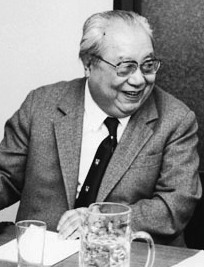
Back فى اكسياوتونج ARZ Fei Xiaotong Catalan Fej Siao-tchung Czech Fei Xiaotong German Φέι Ξιάο-τονγκ Greek Fei Xiaotong EU Fei Xiaotong French ફઇ ઝીઓ-તોગ GU Fei Xiaotong ID 費孝通 Japanese
This article needs additional citations for verification. (October 2021) |
Fei Xiaotong | |
|---|---|
| 费孝通 | |
 Fei at the LSE in 1986. | |
| Vice Chairman of the Standing Committee of the National People's Congress | |
| In office April 8, 1988 – March 16, 1998 | |
| Chairman | Wan Li Qiao Shi |
| Vice Chairman of the Chinese People's Political Consultative Conference | |
| In office June 17, 1983 – April 10, 1988 | |
| Chairwoman | Deng Yingchao |
| Chairman of the China Democratic League | |
| In office January 1987 – November 1996 | |
| Preceded by | Chu Tunan |
| Succeeded by | Ding Shisun |
| Personal details | |
| Born | November 2, 1910 Wujiang, Jiangsu, Qing China |
| Died | April 24, 2005 (aged 94) Beijing, China |
| Political party | China Democratic League |
| Occupation | Anthropologist, sociologist |
| Known for | The development of sociological and anthropological studies in China |
| Fei Xiaotong | |||||||||
|---|---|---|---|---|---|---|---|---|---|
| Traditional Chinese | 費孝通 | ||||||||
| Simplified Chinese | 费孝通 | ||||||||
| |||||||||
| Part of a series on |
| Sociology |
|---|
 |
| This article is part of a series on |
| Liberalism in China |
|---|
Fei Xiaotong or Fei Hsiao-tung (November 2, 1910 – April 24, 2005) was a Chinese anthropologist and sociologist. He was a pioneering researcher and professor of sociology and anthropology; he was also noted for his studies in the study of China's ethnic groups as well as a social activist. Starting in the late 1930s, he and his colleagues established Chinese sociology and his works were instrumental in laying a foundation for the development of sociological and anthropological studies in China, as well as in introducing social and cultural phenomena of China to the international community. His last post before his death in 2005 was as Professor of Sociology at Peking University.[1]
- ^ Boorman, Howard L. (1968). ""Fei Hsiao=t'ung". Biographical Dictionary of Republican China. Vol. II. New York: Columbia University Press. pp. 17–19.